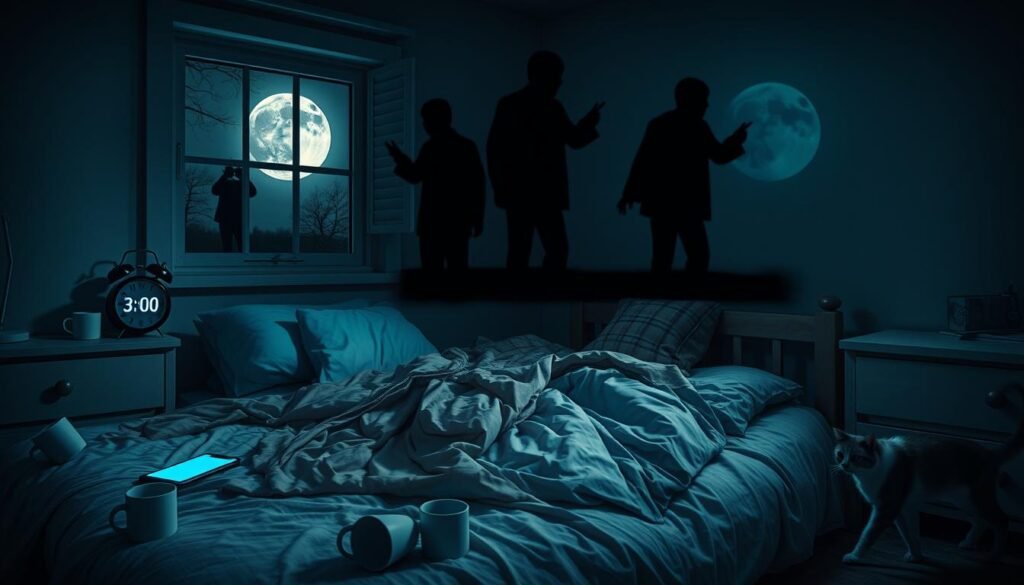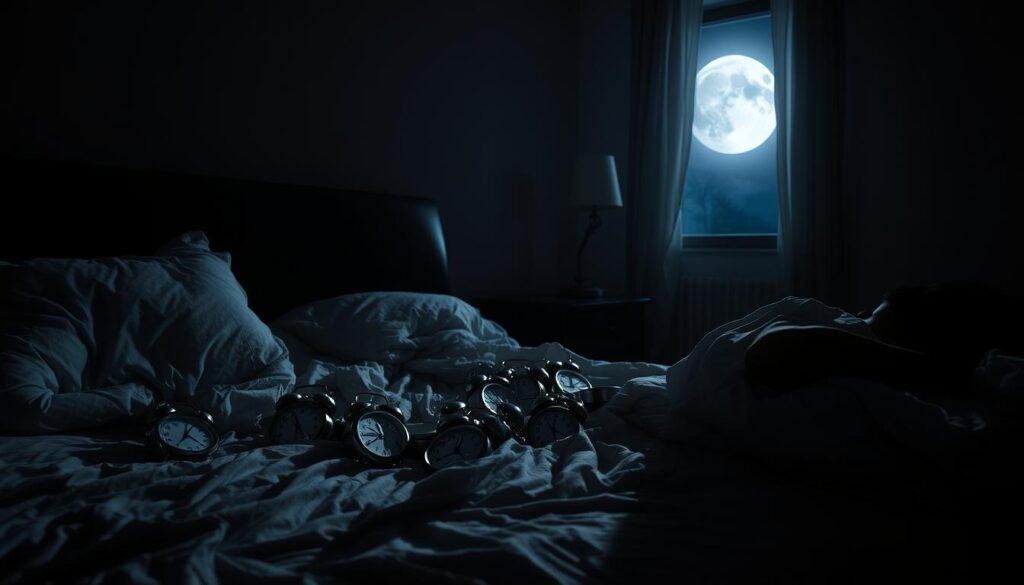Did you know that nearly one in three adults struggle with insomnia symptoms at some stage? This fact highlights the common issue of insomnia that affects many people. It leads to serious health problems if not properly addressed. While adults need 7 to 9 hours of sleep nightly, several factors can interrupt this. Such disruptions can start a cycle of ongoing sleeplessness.
It’s key to understand the factors behind insomnia, like environment, habits, and stress. Short-term sleep issues can become a continuing problem. Delving into the triggers allows us to find ways to fix the sleep issues many face.
Key Takeaways
- Insomnia disparities are widespread, affecting nearly one in three adults.
- Short-term sleep disruption can evolve into chronic insomnia if not addressed.
- Common insomnia triggers include stress, medical conditions, and irregular schedules.
- Impact of insomnia extends to work performance and overall health.
- Effective treatments range from good sleep hygiene to medication.
- Understanding the sleep deprivation causes aids in individual assessment.
- A proactive approach can help prevent long-term sleep issues.
What is Insomnia?
Insomnia is a common sleep disorder that makes it hard to fall asleep or stay asleep. This problem can lead to poor sleep quality or not enough sleep. The term insomnia definition covers both short-term and long-term trouble sleeping. Short-term insomnia lasts from one night to a few weeks. Long-term insomnia is when you have sleep trouble at least three nights a week for three months or more.
People with insomnia often struggle to fall asleep or wake up too early. They may also stay awake for a long time at night. This can cause tiredness in the day, lack of energy, feeling easily annoyed, and problems with focus and memory.
Stats show that more women than men and more older adults than younger ones have insomnia. It also affects young and middle-aged African Americans more than other groups. High stress, feeling upset, earning less money, and irregular work schedules can increase the risk of this common sleep problem.
Types of Insomnia
Knowing the types of insomnia helps with finding the right treatment. Insomnia is split into primary insomnia and secondary insomnia. Primary insomnia stands alone, not caused by other health concerns. Secondary insomnia, however, comes from other medical or psychological issues.
Different specific types of insomnia include:
- Sleep-onset insomnia: Hard to fall asleep at night.
- Sleep-maintenance insomnia: Hard to stay asleep, waking up often.
- Terminal insomnia: Waking up too early and not sleeping again.
- Mixed insomnia: Issues with both falling and staying asleep.
About 10 to 15 percent of people deal with insomnia. It’s more common in people after or during menopause. More often, people have acute insomnia, which lasts a few days to two weeks. This affects about 30 percent of people each year. But, chronic insomnia, which is having symptoms at least three nights a week for three months or more, impacts about 10 percent.
Up to 30 percent of children experience behavioral insomnia. Knowing the different types can guide us to the right treatments. Treating the causes of various insomnias, whether with therapy or medicine, is key to better life quality.
| Type of Insomnia | Description | Typical Duration |
|---|---|---|
| Primary Insomnia | Insomnia not linked to other health issues | Chronic or Acute |
| Secondary Insomnia | Linked to medical or psychological conditions | Varies based on underlying issue |
| Sleep-onset Insomnia | Difficulty falling asleep | Can be short-term or chronic |
| Sleep-maintenance Insomnia | Waking up during the night and trouble falling back asleep | Short-term or chronic |
| Terminal Insomnia | Waking too early and not falling back asleep | Usually chronic |
| Mixed Insomnia | Combination of sleep-onset and sleep-maintenance issues | Chronic |
Insomnia Disorder Causes
Understanding insomnia disorder causes is crucial for managing and treating it. Insomnia comes from various sources. These can be divided into primary and secondary causes. Recognizing them helps address the root causes of sleep problems.
Primary Causes of Insomnia
Stress is a big factor among primary insomnia causes. Big life changes, worry, and tension make it hard to relax and sleep. Other key causes include:
- Irregular sleep schedules
- Environmental disturbances (e.g., noise, light)
- Uncomfortable bedding or room temperature
Secondary Causes of Insomnia
Secondary insomnia causes are often due to health issues. Problems like anxiety, depression, and chronic pain affect sleep. Also, some medicines and substances like caffeine and alcohol disturb sleep. Notable secondary causes are:
- Chronic health conditions (e.g., diabetes, arthritis)
- Mental health disorders (anxiety, depression)
- Substance use (caffeine, nicotine, alcohol)
- Other sleep disorders (e.g., sleep apnea)
To tackle insomnia disorder causes effectively, a detailed check-up is important. This allows for customized treatment plans based on personal needs.
Sleep Disturbances Causes
It’s crucial to know why sleep problems happen to make our sleep better. Things around us and how we live play a big part in how well we sleep. Changing these things can help us sleep more peacefully.
Environmental Triggers
Some things around us can make it hard to sleep. Here’s what they include:
- Excessive noise from cars or house activities.
- Beds that are either too soft or too hard.
- Lights that are too bright, messing with our sleep cycle.
- Room temperatures that are not comfy, making it hard to sleep well.
Dealing with these environmental triggers is key for better sleep. It helps create the right setting for sleeping.
Lifestyle Factors
Our daily habits also affect our sleep. Some common issues are:
- Sleeping at different times, which confuses our body’s clock.
- Too much screen time before bed, making it hard to relax.
- Not moving enough during the day so we aren’t tired at night.
Being mindful of these habits can help lessen sleep problems. Knowing how our daily actions impact sleep lets us make changes for better health.

Insomnia Triggers and Risk Factors
Understanding what causes insomnia is key. Stress from big life changes can lead to sleep problems. Losing a job, ending a relationship, or major stress makes it hard to sleep.
Stress and Life Events
Stress is a big reason for insomnia. Moving or changing jobs shakes up our lives and sleep. Stress over time can cause long-term insomnia. High stress is linked to anxiety and depression, raising insomnia risks.
Health Conditions and Medications
Illnesses like diabetes or heart disease can increase insomnia risk. Some drugs, especially those impacting the brain, can worsen sleep. It’s important to know how prescriptions might affect sleep.
Caffeine, Nicotine, and Alcohol Use
Drinks with caffeine and smoking can mess with sleep. Caffeine keeps you awake, and alcohol might help at first but harms deep sleep later. Knowing how these affect sleep is crucial. Learn more about insomnia triggers linked to what we consume.
Understanding how different factors trigger insomnia helps in tackling sleep issues. Insomnia can show up as tiredness or mood swings during the day. It’s essential to grasp this to manage insomnia better.
The Impact of Sleep Deprivation
Sleep deprivation hits both body and mind hard. Millions in the U.S. struggle with sleep issues. The health risks of insomnia are serious. Not getting enough sleep can lead to many chronic diseases.
Physical Health Consequences
Lack of sleep can cause serious health problems. Some issues it leads to are:
- Increased risk of hypertension
- Heightened likelihood of Type 2 diabetes
- Obesity
- Compromised immune function
- Elevated cholesterol levels
Adults sleeping less than 7 hours face many health risks. The impact of sleep deprivation grows over time. It can increase risks for heart disease and some cancers.
Mental Health Implications
Too little sleep is bad for mental health. People with sleeping problems may suffer from:
- Exacerbated symptoms of anxiety
- Increased depression rates
- Cognitive impairments that affect decision-making and productivity
Studies link mental health and insomnia closely. Not treating sleep issues can lead to severe mental health problems. Missing sleep regularly dulls life’s spark, affecting work and personal life.

Chronic Sleeplessness Factors
Understanding chronic sleeplessness helps explain why so many suffer from insomnia. Factors like age-related insomnia and gender differences play a big role. As people get older, their sleep patterns change. This is more noticeable in older adults. Changes include shifts in sleep cycles and less restorative sleep.
Age and Gender Differences
Insomnia becomes more common as people age. Older adults often struggle with sleep issues due to health problems. Women also experience insomnia more, particularly with hormonal changes. These changes can happen during menstruation and menopause. Addressing these health issues is important.
Co-existing Medical Conditions
Chronic insomnia is often linked with other medical conditions. Issues like diabetes, chronic pain, and mental health problems can make sleeplessness worse. This creates a tough cycle to break. These conditions affect sleep quality, especially for those with chronic illnesses. Understanding this link is key to finding better treatments and improving sleep health.
Effective Solutions for Insomnia
Finding effective solutions for insomnia takes a mix of actions. Changes in behavior and possibly medication are needed. It’s crucial to build a strong base with good sleep hygiene. This means doing things that help you sleep better at night. By doing so, people can greatly improve how well they sleep.
Good Sleep Hygiene Practices
Good sleep hygiene is about creating a sleep-friendly environment. It focuses on:
- Avoiding alcohol, caffeine, and nicotine close to bedtime
- Maintaining a consistent sleep schedule
- Creating a quiet, dark, and comfortable bedroom
- Engaging in regular physical exercise, but not too late
- Restricting heavy meals, especially spicy food, before bed
- Limiting screen time to encourage natural sleep patterns
Adopting these habits is key for better sleep. They are especially important for those having trouble sleeping.
Behavioral Therapies
Behavioral therapies, like Cognitive Behavioral Therapy for Insomnia (CBT-I), are proven to help. They tackle the negative thoughts and actions that disrupt sleep. CBT-I uses strategies such as:
- Stimulus control methods that link the bed with sleeping
- Sleep restriction therapy to match bed time with sleep time
- Relaxation techniques, like muscle relaxation and breathing exercises
These approaches help individuals take control of their sleep. And they do so without needing sleeping pills.
Role of Medication
In some cases, medication might be needed to tackle insomnia. Always talk to doctors before trying any medication. It’s important to use sleeping pills carefully to avoid becoming dependent. Medication should support, not replace, good sleep habits and behavioral strategies.

Alternative Approaches to Managing Insomnia
Looking for ways to beat insomnia might take you beyond usual medical treatments. Trying alternative methods can add to standard solutions, helping you sleep better.
Herbs and Supplements
Many people explore herbs for sleep for a natural way to fight insomnia. Favorites include valerian root for its calming effects, chamomile, and passionflower. These herbs have helped many across different cultures to relax and calm down. Melatonin supplements are also popular for fixing the sleep cycle. But, it’s important to get advice from experts when using supplements to stay safe and get good results.
Mindfulness and Relaxation Techniques
Adding mindfulness to your daily habits can offer great relaxation techniques for insomnia. Trying out meditation, breathing deeply, and relaxing your muscles can calm your brain and lower stress. This can lead to better sleep. Doing these regularly helps your body get ready for sleep, playing a key role in battling insomnia.
If you’re curious about different choices, check out professional guides like insomnia treatment guides for more info on using alternative methods effectively.
| Herb/Supplement | Benefits | Usage |
|---|---|---|
| Valerian Root | Promotes relaxation and reduces time taken to fall asleep | 500-1000 mg before bedtime |
| Chamomile | Calming effect; helps in anxiety reduction | Tea or capsules |
| Melatonin | Regulates natural sleep cycle | 0.5-5 mg shortly before bedtime |
| Passionflower | Improves sleep quality and helps with anxiety | Tea or extract; dosage varies |
Importance of Seeking Professional Help
Knowing when to get professional help for insomnia is key for anyone whose daily life is upset by not sleeping well. If sleep problems continue, reach out to a healthcare professional fast. Getting help early can make managing insomnia easier, leading to better health overall.
When to Consult a Healthcare Provider
It’s vital to know when it’s time to talk to a doctor about sleep troubles. Look out for these signs:
- Problems with falling or staying asleep lasting several weeks.
- Being very tired during the day.
- Feeling moody or anxious because of sleep issues.
- Seeing a bad effect on your day-to-day life or work.
Talking to a doctor about your sleep can help you understand what’s going on. They might suggest cognitive behavior therapy (CBT) for trouble sleeping like insomnia. This usually involves six to eight sessions and can tackle the root of sleep issues.
Diagnostic Procedures for Insomnia
Finding out if you have insomnia starts with a deep look at your sleep habits and health history. This might include:
- Keeping a sleep diary.
- Filling out questionnaires about how you feel mentally and emotionally.
- Being sent to a sleep specialist for more tests, possibly including sleep studies.
Remember, treating insomnia does more than just help you sleep better. It also lowers your risk for other health issues. Seeing a doctor is a big step towards better sleep and health.
Insomnia and Lifestyle Modifications
Small lifestyle changes can greatly ease insomnia symptoms. A peaceful sleep space and steady routines improve sleep. By following sleep tips and forming healthy habits, you can move closer to better rest at night.
Creating a Restful Sleep Environment
Having a good sleep setting is key for better rest. Here are tips for a sleep-friendly environment:
- Maintain a dark, quiet, and cool bedroom to sleep deeper.
- Use heavy curtains, blackout shades, or eye masks to keep it dark.
- Reduce noise with earplugs or white noise machines.
- Pick comfy bedding and a supportive mattress for ease during sleep.
- Avoid electronic devices in the bedroom to cut light and noise distractions.
Daily Routines to Promote Better Sleep
Good daily habits can change your life and battle insomnia. Follow these steps:
- Stick to regular sleep and wake times, even on weekends.
- Avoid caffeine and big meals before bed for better digestion and calm.
- Exercise during the day helps fend off sleep issues.
- Try relaxing evening activities like reading or meditating to unwind.
- Stay away from screens and bright lights before bedtime.
These steps for battling insomnia can start a positive cycle, building good sleep habits. Focusing on your sleep setting and daily routines helps you move towards more restful nights.
Preventing Insomnia
It’s important to stop insomnia before it starts. This means changing habits for better sleep. If you start using healthy sleep habits, you can avoid sleep problems.
Strategies for a Healthy Sleep Schedule
Having a set sleep schedule is a big step towards good sleep. Going to bed and waking up at the same time every day helps. It tunes your body’s clock to expect sleep. Reading or a warm bath before helps you relax. Make sure your room is dark, cool, and quiet for the best sleep.
Adding good sleep habits to your daily routine is smart. This helps put sleep first and cuts down on sleep problems.
Long-term Lifestyle Changes
For long-term sleep health, make some lifestyle changes. Regular exercise helps you sleep better and lowers stress. Cutting down on caffeine, alcohol, and smoking helps too.
Having a bedtime routine like meditation or stretching helps you fall asleep. Knowing how daily actions affect sleep leads to better sleep choices. This creates a space where good sleep happens.
| Strategies | Description |
|---|---|
| Consistent Sleep Schedule | Go to bed and wake up at the same time every day. |
| Relaxing Pre-bedtime Ritual | Engage in calming activities like reading or warm baths. |
| Comfortable Sleep Environment | Maintain a dark, quiet, and cool bedroom. |
| Regular Physical Activity | Exercise regularly to reduce stress and improve sleep. |
| Limit Stimulants | Reduce caffeine, alcohol, and nicotine intake. |
Conclusion
It’s key to grasp the complex nature of insomnia and how it affects us. Around 10% of adults struggle with chronic insomnia. This makes understanding sleep health very critical.
Insomnia doesn’t just affect our sleep. It’s also tied to health issues like depression and anxiety. These links show why we need effective ways to manage it.
Mixing lifestyle changes and getting expert advice can greatly better sleep habits. Non-drug treatments show strong success, with 70-80% of patients seeing improvements from cognitive behavioral therapy.
With the right steps, you can see big improvements in handling insomnia.
Improving insomnia is crucial for better physical and mental well-being. Knowing the risk factors linked to insomnia helps in taking steps to improve sleep quality. For a detailed summary of insomnia causes and solutions, it’s vital to know how crucial sleep health is for a balanced life.